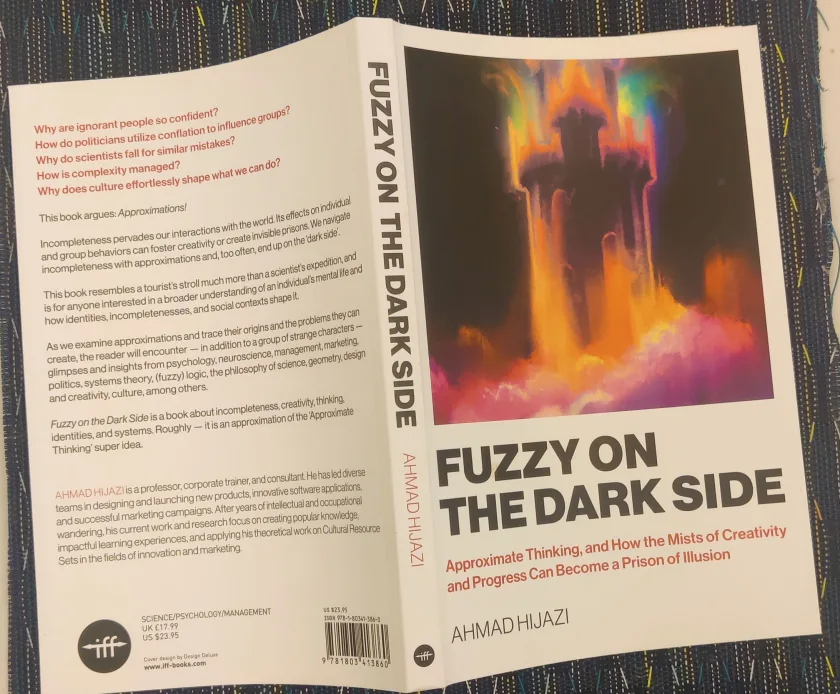
Fuzzy on the Dark Side: Approximate Thinking, and How the Mists of Creativity and Progress Can Become a Prison of Illusion by Ahmad Hijazi unravel the fascinating world of thinking on the fly. The author here explores, the idea of “Approximate Thinking”.
I received a copy from Collective Ink. And this is my honest book review.
Within the pages of this book, the author expertly unveils the dilemma born from the realm of approximate thinking. It exposed the potential pitfalls that often lurk in the shadows of our snap judgments. It’s like a journey into the intricacies of our thought process, highlighting the risks we unknowingly take.
Nevertheless, by weaving in conscious steps like critical thinking, the book empowers us to recognize these pitfalls and master the art of skillful navigation. The underlying mantra? Think smarter, not faster!
Trusting Immediate Perception alone isn’t Sufficient
To start with, relying solely on our immediate perception could be disastrous because our initial impressions are often shaped by cognitive biases, emotional responses, and quick mental shortcuts.
Additionally, our brains are wired to prioritize speed over accuracy in certain situations. And this can result in overlooking important details or making decisions based on incomplete information. Thinking on these lines of thoughts, the book appears to throw light on the following themes:
- Incompleteness: It means that whatever knowledge, information we have for any system is inherently incomplete. This is because of the limitations. Since we as humans can only access a slice of reality, which is also influenced by one’s own perspectives. Therefore, some things will always be unknown or ambiguous. Also, when it comes to behaviour, people may make decisions based on assumptions rather than accurate information.
- Creativity: Humans are like idea factories, cranking out fresh, never-seen-before concepts. But there’s a catch. Our brains run on “approximate thinking.” It’s like our mental shortcut system – we take the fast track by using tricks and spotting patterns to solve problems.
- Thinking: We’ve all got these mental quirks called cognitive biases – like confirmation bias and anchoring – that mess with the way we see and judge stuff. It’s like having a filter on our brains. They kind of lock us into one way of thinking, making it a bit tricky to venture into the wild world of alternative perspectives.
- Identities: It refer to the mental constructs, roles, and self-images that individuals form based on their experiences, beliefs, and social influences. So identities play a major role in how we see ourselves and the whole world around us. It’s not just about who we are, but also about how we navigate through life, making sense of everything that’s going on. So, these identities are basically the lens through which we view the world and figure out your place in it.
- Systems: When we’re dealing with the complex systems, sometimes we gotta rely on approximate thinking. It’s like using heuristics or mental shortcuts to make decisions on the fly. Now, these shortcuts won’t always give the absolute best solutions, but it’s a bit like taking the fast lane in the decision-making highway.
Hijazi warns us that always relying on mental approximations is not a good idea. In fact, quick gut-feel judgments might be a double-edged sword. Although, they are quick but these rapid-fire decisions can set us up for some serious blind spots.
He further says biases and misunderstandings could be a set of illusions. Cooked up in the kitchen of our own mental kitchen. After all, brain is fond of conjuring up its own version of reality.

Takeaway
Through this book, Hijazi urges his readers to embrace skepticism and critical thinking as our trusty sidekicks when navigating the world. He encourages us to:
- Question our assumptions: Don’t take things at face value. Ask questions, challenge assumptions, and dig deeper to uncover the layers beneath the surface. Periodically question your own beliefs and opinions. Are they based on evidence, or are they influenced by emotions or social pressure?
- Consider Multiple Perspectives: Look at situations from different angles. Understand that there’s often more than one side to a story, and diverse perspectives can provide a more comprehensive view.
- Embrace ambiguity: Not everything has a clear-cut answer. Learning to navigate uncertainty is crucial to avoiding snap judgments and cognitive biases.
- Stay Curious: Cultivate a curious mindset. Explore new ideas, seek knowledge, and be open to learning. Curiosity fuels critical thinking.
- Value rigor over speed: Slow down, gather information, and carefully analyze before drawing conclusions.
- Engage in Constructive Dialogue: Discuss ideas with others, especially those who hold different viewpoints. Constructive dialogue promotes a deeper understanding and helps refine your own thinking.
By nurturing these habits, we can create a thinking that can act through the fog of illusion. Thus, allowing us to see and progress with a more grounded and insightful perspective.
Approximate thinking alone may not help us but if we combine it with critical thinking, diverse perspectives, and inherent curiosity we will surely not get caught into the web of mental confusion. For those eager to navigate the maze of their own thoughts more skillfully, this book does offer some interesting insights.



